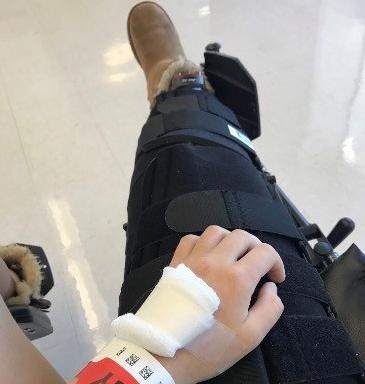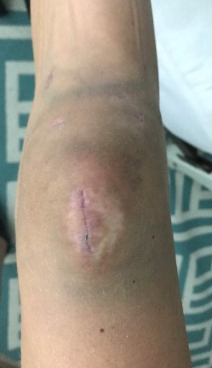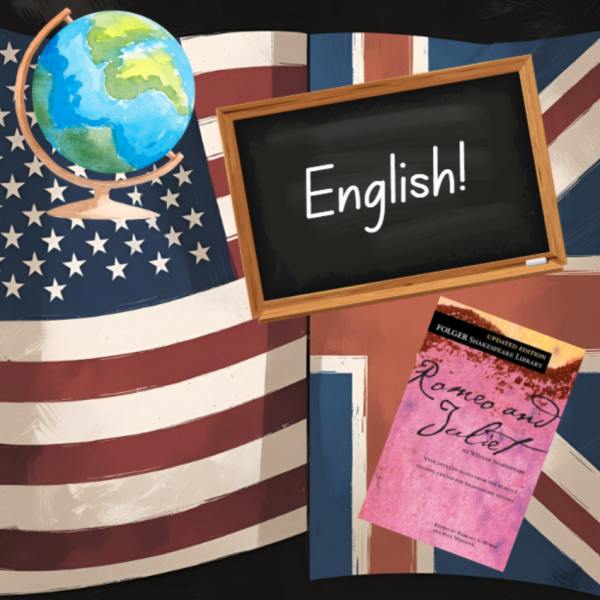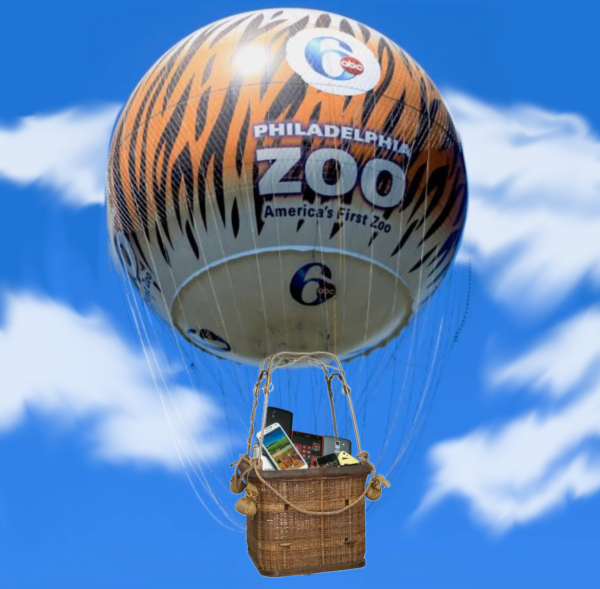Pop: The Psychology of Injury

December 11, 2018
“I heard the pop, and I was at least ten feet away. I thought that the girl had hit you, and that’s why you collapsed. I think everyone thought it was a contact injury,” said Marissa, the left centerback, who was the closest person to me on the field both literally and metaphorically. She was the first to call out to the referee to stop the game for the injured player writhing and screaming on the ground, and she was the first to be by that player’s side. Not far behind her were assistant coach and the athletic trainer.
“Well, the second the ref stopped the game, I ran out onto the field. I didn’t see the play, I only heard your scream.” Keith, the Radnor High School athletic trainer, who acts as team doctor most days. On the sunny Saturday afternoon of August 25th, 2018, he took on that role: “I referred you to Dr. Freedson at Rothman Institute. They specialize in joint injuries, especially knees.”
So two days later, I was off to the Rothman Institute for an obligatory x-ray and an appointment with Dr. Freedson. The knee was swollen, stiff, and refusing to extend past ninety degrees. Freedson took my tibia in one hand and my lower femur in the other and shook the two body parts violently in interfering intervals, hoping to see that my knee could still lock itself and had stability while I squeeze the table and bit my lip. “I’m very concerned about this knee. To me, it’s looking pretty loose. I’m going to refer you for an MRI.”
“Do you think it’s ACL?”
“I believe so.”
Pop. All I could hear was that pop. It was so clear…so alone. My eyes flooded with tears. If he was right, my high school athletic career was over. It would serve as an athletic gravestone. I prayed that his Ivy League degrees would betray him this time and he would be wrong. I headed to Havertown the following week for the MRI.
We got the MRI, but never went back to the Rothman Institute. Instead, we tried Dr. Bartolo in center city Philadelphia. He took the MRI disc from me and fed it into his computer, displaying the results on the screen in front of me. I tried desperately to make sense of the bright white blob of what was supposed to be my knee, utilizing all the information I had gained by attempting to self-diagnose.
“So this is just fluid, the swelling. In here is where your ACL should be, yours is gone.” The sob I had been trying to hold back escaped me. Dr. Bartolo looked at me sympathetically, knowing all too well the implications of this diagnosis for a young athlete.
He continued, “Over here is your Meniscus…that’s pretty ripped up too. And last but not least, on the left side is your MCL. I would diagnose that as a grade two sprain, which is basically a tear but not all the way through.”
My dad has had both ACLs reconstructed in his life. “I knew from the second you fell like that it was ACL. A player doesn’t just go down how you did unless it’s that serious. I saw you collapse, but I didn’t think that the girl had hit you. It was just slippery.” He’s no stranger to knee injuries, and he taught me how to protect my knees while playing sports since I was a U6 soccer player. Both he and I knew that once you hear the pop, it’s over. That’s the telltale sign of the ultimate knee injury.
“Yeah, it’s the one you don’t want to have. The big one. Every athlete’s nightmare. But you’ll got the surgery, and in nine months you’ll be back and you’ll be stronger. That’s what I’m here for.” Andrea drives from Reading every Tuesday, Thursday, and Saturday to help me with regaining range of motion, strength, and confidence post-surgery. She acts as a physical therapist and sometimes just a regular therapist, since most of our sessions end in tears with me yelling about how I can’t understand why this happened to me.
Every serious athlete reaches a point where they feel like they’ve peaked; for me, that was supposed to be this year. Coming off an incredibly successful Junior season, where I was decorated with honors from coaches, the Central League, Mainline soccer, and more, I was focused on bigger and better things coming into preseason. I spent all summer working out and preparing to ascend to that leadership role all seniors have on sports teams, and focusing in on my goals for the upcoming year.
Having something happen in less than a second that can change the whole course of your life makes you feel small. If I had just said no when asked if I wanted to go out and play again by my coach in the last ten minutes of the scrimmage we were already winning that day, if I had just let the other centerback do her job, instead of trying to do everything myself, if I had taken smaller steps, or moved more slowly, if we had just played on a turf field, or a field that wasn’t so muddy…if, if, if. For months, these were the thoughts that circulated through my head while I couldn’t sleep at night. The things I could’ve done differently, or the things my teammates could’ve done, or my coaches. I’d toss and turn and end up back in the same spot—but I did do those things. I can’t change the past. It’s difficult to admit and even harder to come to terms with: my senior year was over before it even began.
That’s the thing about being alive—everything can change in an instant, with no warning ahead of time. Sometimes that’s a blessing, other times it’s devastating and you think you’ll never recover. You are only in control of what happens to you to a degree; past that, you have to sit back and let the world do its work. My career as a high school athlete ended abruptly and prematurely that day. My knee was badly damaged, but my confidence and self-esteem suffered more. When you identify with a group of people and suddenly, you’re irrevocably split from them with no hope of regaining your place, questions of self-worth and purpose often become inescapable. This is exactly what I encountered after my diagnosis. I spent weeks on end shut in my room, trying desperately to work through the flood of emotions. I went to every practice and game for RGS, and I tried my best to keep my feelings in check while having to sit on the sidelines and watch the people I love play the game I love even more. The losses started coming and with a few notable exceptions, they didn’t stop. Although probably selfish, I felt guilty about our losing record and put the blame on myself for being out of the games all year.
Today marks twenty days post-op. I’m still on crutches, but at least I’m not in a wheelchair anymore. My physical therapist has warned me that I would fall behind since I’m going to school every day—failing to manage multiple hours of physical therapy, school responsibilities, and extracurriculars has forced me to cut back and attempt to focus on regaining my ability to walk unassisted.
Dr. Bartolo used a tendon from my quadricep to construct my new ACL ligament. Because my right leg has been relatively immobile for the past three weeks, my muscles in that leg have atrophied beyond recognition. I can no longer lift my leg off the bed on my own. This problem manifests in many situations; anything from getting up off the couch to attempting to climb into a car will aggravate it. Never before have I understood how important those muscles are. Mental strength has become even more critical than physical strength, at this point. I’m looking at another six months, minimum, to ten months, maximum, of physical therapy to try to get back to who I was before the injury.
When you get the surgery, your surgeon will tell you that the incisions will be minimal, since nowadays they do a lot of the operation arthroscopically. “You’ll hardly even notice them!”, I was convinced the morning of my surgery. Three days later, I took off the gauze for my first shower since that day. I certainly noticed them—I immediately lost consciousness at the sight of my mangled, swollen knee. The biggest incision was about three and a half inches long; there were four others that were probably half an inch each. All were angry and red. Little did I know, this experience would become a representation of the entire journey; meaning, definitely not what I was told to expect.
Yet, time moves on. Today I sat on my rowing machine with my feet tied in and took (a variation of) a stroke—that’s progress. I’m at one hundred degrees flexion, up from twenty on the day after the surgery. I can sometimes walk without crutches, and yesterday I climbed the stairs with my bad leg first. Day by day, small victories may be all I can look forward to. Regardless, I’m well enough to start doing little things to become an athlete again. I’m done looking back and trying to change the past. The battle to reclaim my identity is raging on, and with a lot of hard work and a little faith, I’m moving forward.







